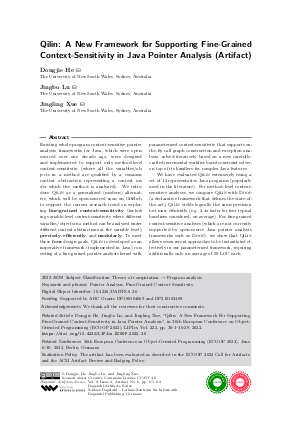Qilin: A New Framework for Supporting Fine-Grained Context-Sensitivity in Java Pointer Analysis (Artifact)
Authors Dongjie He, Jingbo Lu, Jingling Xue
-
Part of:
Issue:
Special Issue of the 36th European Conference on Object-Oriented Programming (ECOOP 2022)
Part of: Volume: DARTS, Volume 8 (ECOOP 2022)
Part of: Conference: European Conference on Object-Oriented Programming (ECOOP)
Part of: Journal: Dagstuhl Artifacts Series (DARTS) - License:
 Creative Commons Attribution 4.0 International license
Creative Commons Attribution 4.0 International license
- Publication Date: 2022-06-23
Artifact Description

PDF
DARTS.8.2.6.pdf
- Filesize: 0.55 MB
- 3 pages
Document Identifiers
Subject Classification
ACM Subject Classification
- Theory of computation → Program analysis
Keywords
- Pointer Analysis
- Fine-Grained Context Sensitivity
Metrics
- Access Statistics
-
Total Accesses (updated on a weekly basis)
0Document
0Metadata
Artifact
DARTS-8-2-6-artifact-d0524c71bb102a192eb7f3e226d1d446.0.zip
(Filesize: 1.51 GB)
MD5 Sum:
d0524c71bb102a192eb7f3e226d1d446
(Get MD5 Sum)
Artifact Evaluation Policy
The artifact has been evaluated as described in the ECOOP 2022 Call for Artifacts and the ACM Artifact Review and Badging Policy
Abstract
Existing whole-program context-sensitive pointer analysis frameworks for Java, which were open-sourced over one decade ago, were designed and implemented to support only method-level context-sensitivity (where all the variables/objects in a method are qualified by a common context abstraction representing a context under which the method is analyzed). We introduce Qilin as a generalized (modern) alternative, which will be open-sourced soon on GitHub, to support the current research trend on exploring fine-grained context-sensitivity (including variable-level context-sensitivity where different variables/objects in a method can be analyzed under different context abstractions at the variable level), precisely, efficiently, and modularly. To meet these four design goals, Qilin is developed as an imperative framework (implemented in Java) consisting of a fine-grained pointer analysis kernel with parameterized context-sensitivity that supports on-the-fly call graph construction and exception analysis, solved iteratively based on a new carefully-crafted incremental worklist-based constraint solver, on top of its handlers for complex Java features. We have evaluated Qilin extensively using a set of 12 representative Java programs (popularly used in the literature). For method-level context-sensitive analyses, we compare Qilin with Doop (a declarative framework that defines the state-of-the-art), Qilin yields logically the same precision but more efficiently (e.g., 2.4x faster for four typical baselines considered, on average). For fine-grained context-sensitive analyses (which are not currently supported by open-source Java pointer analysis frameworks such as Doop), we show that Qilin allows seven recent approaches to be instantiated effectively in our parameterized framework, requiring additionally only an average of 50 LOC each.
Cite As Get BibTex
Dongjie He, Jingbo Lu, and Jingling Xue. Qilin: A New Framework for Supporting Fine-Grained Context-Sensitivity in Java Pointer Analysis (Artifact). In Special Issue of the 36th European Conference on Object-Oriented Programming (ECOOP 2022). Dagstuhl Artifacts Series (DARTS), Volume 8, Issue 2, pp. 6:1-6:3, Schloss Dagstuhl – Leibniz-Zentrum für Informatik (2022)
https://doi.org/10.4230/DARTS.8.2.6
BibTex
@Article{he_et_al:DARTS.8.2.6,
author = {He, Dongjie and Lu, Jingbo and Xue, Jingling},
title = {{Qilin: A New Framework for Supporting Fine-Grained Context-Sensitivity in Java Pointer Analysis (Artifact)}},
pages = {6:1--6:3},
journal = {Dagstuhl Artifacts Series},
ISSN = {2509-8195},
year = {2022},
volume = {8},
number = {2},
editor = {He, Dongjie and Lu, Jingbo and Xue, Jingling},
publisher = {Schloss Dagstuhl -- Leibniz-Zentrum f{\"u}r Informatik},
address = {Dagstuhl, Germany},
URL = {https://drops.dagstuhl.de/entities/document/10.4230/DARTS.8.2.6},
URN = {urn:nbn:de:0030-drops-162040},
doi = {10.4230/DARTS.8.2.6},
annote = {Keywords: Pointer Analysis, Fine-Grained Context Sensitivity}
}
Author Details
Funding
Supported by ARC Grants DP180104069 and DP210102409.
Acknowledgements
We thank all the reviewers for their constructive comments.
Related Article
- Dongjie He, Jingbo Lu, and Jingling Xue, "Qilin: A New Framework For Supporting Fine-Grained Context-Sensitivity in Java Pointer Analysis", in 36th European Conference on Object-Oriented Programming (ECOOP 2022), LIPIcs, Vol. 222, pp. 30:1-30:29, 2022. https://doi.org/10.4230/LIPIcs.ECOOP.2022.30
References
-
Lars Ole Andersen. Program analysis and specialization for the C programming language. PhD thesis, University of Cophenhagen, 1994.

- Stephen M. Blackburn, Robin Garner, Chris Hoffmann, Asjad M. Khang, Kathryn S. McKinley, Rotem Bentzur, Amer Diwan, Daniel Feinberg, Daniel Frampton, Samuel Z. Guyer, Martin Hirzel, Antony Hosking, Maria Jump, Han Lee, J. Eliot B. Moss, Aashish Phansalkar, Darko Stefanović, Thomas VanDrunen, Daniel von Dincklage, and Ben Wiedermann. The DaCapobenchmarks: Java benchmarking development and analysis. In Proceedings of the 21st annual ACM SIGPLAN conference on Object-oriented programming systems, languages, and applications, pages 169-190, New York, NY, USA, 2006. Association for Computing Machinery. URL: https://doi.org/10.1145/1167515.1167488.
-
Martin Bravenboer and Yannis Smaragdakis. Strictly declarative specification of sophisticated points-to analyses. In Proceedings of the 24th ACM SIGPLAN conference on Object oriented programming systems languages and applications, pages 243-262, New York, NY, USA, 2009. Association for Computing Machinery.

-
Ana Milanova, Atanas Rountev, and Barbara G Ryder. Parameterized object sensitivity for points-to analysis for Java. ACM Transactions on Software Engineering and Methodology, 14(1):1-41, 2005.

-
Micha Sharir and Amir Pnueli. Two approaches to interprocedural data flow analysis. In S. S. Muchnick and N. D. Jones, editors, Program Flow Analysis: Theory and Applications, chapter 7, pages 189-234. Prentice-Hall, 1981.

